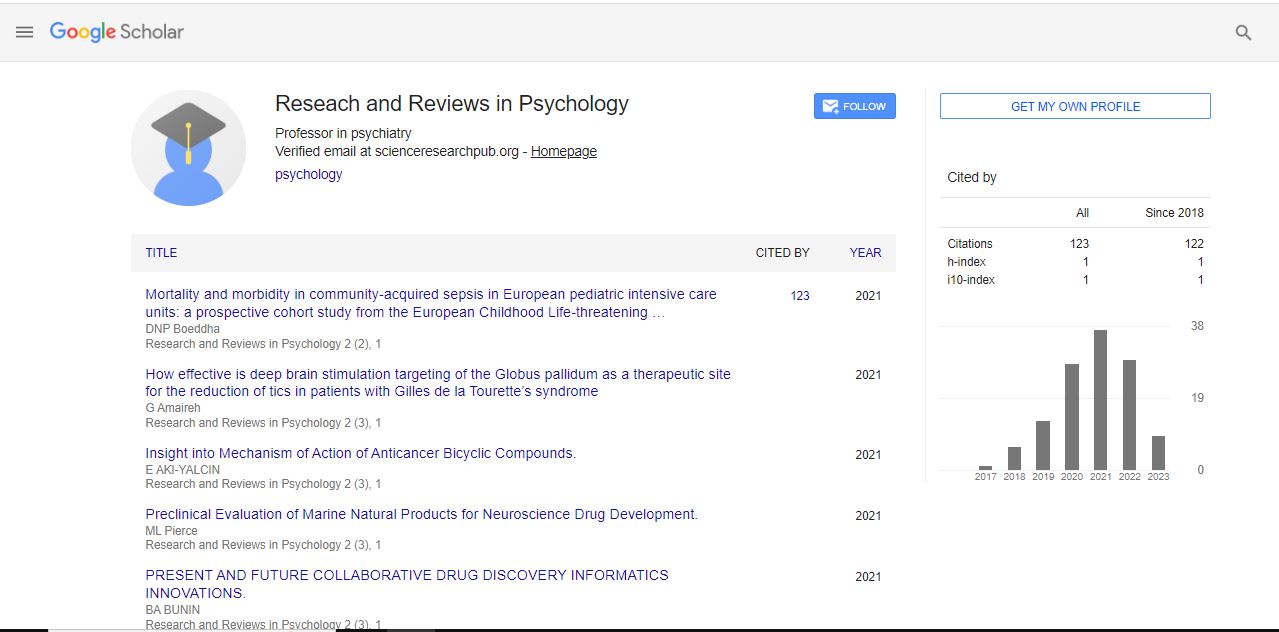Short Communication, Res Rev Phys Vol: 4 Issue: 1
Assessment and Outcomes of Neuropsychology
Methley Stepien*
Department of Neurology, McGill University, Montreal, Canada
*Corresponding Author: Methley Stepien
Department of Neurology, McGill University, Montreal, Canada;
E-mail: stepien.m@gmail.com
Received: 03 March, 2023, Manuscript No. RRPY-23-93457; Editor assigned: 06 March, 2023, PreQC No. RRPY-23-93457 (PQ); Reviewed: 20 March, 2023, QC No. RRPY-23-93457; Revised: 27 March, 2023, Manuscript No. RRPY-23-93457 (R); Published: 06 April, 2023 DOI: 10.4172/rrpy.1000324.
Citation: Stepien M (2023) Assessment and Outcomes of Neuropsychology. Res Rev Phys 4:1.
Description
Neuropsychology is a branch of psychology that investigates the relationship between behavior and brain function. It is an interdisciplinary field that is based on neuroscience, psychology, and medicine to investigate the brain effects behavior and mental processes. Neuropsychologists are interested in understanding how different regions of the brain are involved in cognitive processes, such as attention, memory, language, and perception. They also study how brain injuries, diseases, and other disorders affect these processes. Neuropsychologists use a variety of methods to investigate brain function and behavior. One of the most commonly used methods is Cognitive neuroscience testing. Neuropsychological tests are designed to assess various characteristics of cognitive function, such as Cognition, recognition, language, and perception. These tests can be administered to people with normal cognitive function to establish a baseline for comparison, or they can be used to diagnose and assess the severity of cognitive impairments in people with brain injuries, diseases, or disorders[1-4].
One of the key tools used in neuropsychological testing is the standardized test battery. Standardized test batteries are sequence of tests that are designed to assess different aspects of cognitive function in a standardized manner. They are typically administered to patients who have suffered from brain injuries, diseases, or disorders to assess the extent and nature of their cognitive impairments. Another important method is used in neuropsychology is neuroimaging. Neuroimaging techniques, such as Magnetic Resonance Imaging (MRI) and Positron Emission Tomography (PET), allow researchers to visualize brain activity and to identify areas of the brain that are involved in specific cognitive processes. For example, neuroimaging studies have demonstrated that the area of the brain is involved in working memory and concentration, whereas the temporal lobes are involved in language comprehension[5-7].
Cognitive neurosciences are also interested in studying the effects of brain injuries, diseases, and disorders on cognitive function. For example, Traumatic Brain Injuries (TBIs) can lead to a various cognitive impairments, including memory loss, attention deficits, and problems with executive function. Neuropsychologists use a wide range of techniques to assess the extent and nature of these impairments, including cognitive neuroscience testing, neuroimaging, and behavioral observation. In addition to studying the effects of brain injuries and diseases on cognitive function, neuropsychologists are also interested in analyzing the brain changes over the lifespan. For example, as people age, they frequently have changes in cognitive function, such as declines in memory and attention. Developmental psychologists investigate these changes in order to improve their perception of the way brain functions and to develop interventions to assist older adults in maintaining cognitive function[8-11].
Cognitive neurosciences also play an important role in the diagnosis and treatment of a variety of neurological and psychiatric disorders. For example, cognitive neurosciences testing can be used to diagnose conditions such as Alzheimer's disease, Parkinson's disease, and multiple sclerosis. Neuropsychologists can also help to develop and implement treatment plans for these disorders, which may include medication, cognitive rehabilitation, and behavioral interventions.
Cognitive neuroscience has also contributed to understanding of the relationship between brain function and mental illness. For example, studies have shown that individuals with schizophrenia have abnormalities in brain structure and function, particularly in the prefrontal cortex and other areas involved in cognitive processing. It has used this knowledge to develop new treatments for schizophrenia, including cognitive behavioral therapy and medications that target specific neurotransmitters in the brain. Overall, neuropsychology is an important field that has contributed greatly to understanding of the relationship between the brain and behavior. Clinical psychologists have assisted in making of new treatments for a wide range of neurological and mental health conditions by analyzing the brain influences cognitive processes and behavior.
References
- Polich J, Criado JR (2006) Neuropsychology and neuropharmacology of P3a and P3b. Int J Psychophysiol 60(2):172-185.
[Crossref] [Google Scholar] [Pub Med]
- Previc FH (1998) The neuropsychology of 3-D space. Psychol Bull 124(2):123.
[Crossref] [Google Scholar] [Pub Med]
- Walsh KW (1978) Neuropsychology: A clinical approach. Churchill Livingstone.
- Zillmer EA, Spiers MV (2001) Principles of neuropsychology. Wadsworth/Thomson Learning.
- Beaumont JG (2008) Introduction to neuropsychology. Guilford Press.
- McCarthy RA, Warrington EK (1990) Cognitive neuropsychology: A clinical introduction.
- Andrewes D (2015) Neuropsychology: From theory to practice. Psychology Press.
- Shallice T (1988) From neuropsychology to mental structure. Cambridge University Press.
- Heilman MK, Valenstein E (2010) Clinical neuropsychology. Oxford University Press. [Google Scholar]
- Squire LR (1982) The neuropsychology of human memory. Annu Rev Neurosci 5(1):241-273.
[Crossref] [Google Scholar] [Pub Med]
- Beach FA, Hebb DO, Morgan CT, Nissen HW (1960) The neuropsychology of Lashley. McGraw-Hill.
 Spanish
Spanish  Chinese
Chinese  Russian
Russian  German
German  French
French  Japanese
Japanese  Portuguese
Portuguese  Hindi
Hindi 